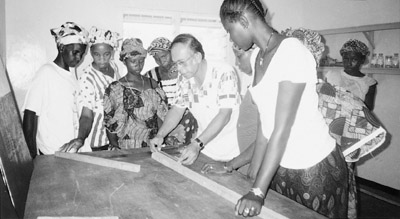


Dans le cadre du Programme d'experts en CTPD, l'Indonésie - pays de 185 millions d'habitants, qui a consenti d'importants efforts pour couvrir ses besoins en riz - a envoyé deux spécialistes en Gambie pour inculquer aux riziculteurs de ce pays - des femmes essentiellement - des méthodes destinées à accroître la production rizicole du pays. Le riz étant un produit primaire en Gambie, le pays doit importer 60 000 à 70 000 tonnes par an pour nourrir une population d'un million d'habitants. Les experts indonésiens - MM. Dadang Sugriwa et Kusnomo Tamkani - ont passé huit mois à former des productrices au nouveau Centre agricole et rural de formation des agriculteurs de Jenoi (Division de la basse vallée du fleuve).
Les experts ont pu, en mettant à profit la longue expérience qu'ils ont acquise dans leur propre pays, inculquer de nouvelles techniques d'un coût abordable et applicables en matière de plantation, de récolte et de battage. Ces techniques ont permis d'accroître la production de riz en Gambie (les rendements ont atteint 6 à 8 tonnes à l'hectare dans six parcelles de démonstration, comparés aux 1 à 2 tonnes dans les champs de contrôle) et de réduire de manière significative la main-d'oeuvre nécessaire pour produire cette culture.
Como valioso ejemplo de transmisión de tecnología entre países en desarrollo al amparo del Programa de Expertos CTPD, Indonesia, país de 185 millones de habitantes, que ha hecho grandes avances hacia su autosuficiencia en producción de arroz, cedió dos expertos arroceros a Gambia para formar a sus cultivadores de arroz, predominantemente mujeres, en métodos para impulsar la producción arrocera del país.
El arroz, siendo un cultivo primario, se produce poco en Gambia, que tiene que importar de 60 000 a 70 000 t de arroz al año para alimentar a su población de un millón de habitantes.
Los expertos indonesios en arroz, Dadang Sugriwa y Kusnomo Tamkani, pasaron ocho meses formando agricultores en el recién creado Centro de Capacitación Agrícola y Rural para Agricultores en Jenoi.
Los expertos indonesios en CTPD se valieron de su experiencia de tantos años en su país para trasladar técnicas nuevas de siembra, recolección y trilla. Con ellas no sólo aumentaron la producción de arroz en Gambia sino que también se redujo considerablemente la mano de obra necesaria para producir el cultivo.
![]()
In a valuable example of technology transfer between developing countries under the TCDC Experts Programme, Indonesia, a country of 185 million inhabitants that has made great strides towards self-sufficiency in rice production, loaned two rice experts to the Gambia to train its predominantly female rice farmers in methods to boost the country's rice production.
Since rice is an underproduced primary crop, the Gambia has to import 60 000 to 70 000 tonnes of rice per year to feed its population of one million people. Indonesia and the Gambia share similar growing conditions but, as a result of having to feed a very large population, Indonesia has developed expertise in the high-yielding cereal varieties and advanced farming techniques which are needed in order to improve the Gambia's rice production.

Gambian women rice farmers participating in "on-the-job" training at a farmer field school |
Indonesian rice experts Dadang Sugriwa and Kusnomo Tamkani spent eight months training farmers at the newly constructed Agricultural and Rural Training Centre at Jenoi, Lower River Division. The new training centre's objective is to apply the "farmer-to-farmer" training concept, and Gambian farmers who had received training in Indonesia worked alongside the two experts to train some 50 to 100 farmers in rice production techniques. The Indonesian TCDC experts drew on many years of experience in their own country to convey new, affordable and implementable planting, harvesting and threshing techniques. As a result, rice production increased (yields reached 6 to 8 tonnes/ha in six of the demonstration plots compared with 1 to 2 tonnes/ha in the control fields) while the labour required to produce the crop was reduced significantly. The new techniques were enthusiastically adopted by the women farmers who participated in the three highly successful 11-day courses for 76 farmers (divided into three groups). In future, it is hoped that course trainers will be women farmers who have been trained in Indonesia.
A key idea introduced by the Indonesian experts is that the best course students will be encouraged to train groups of about 25 women farmers "on the job" in farmer field schools (FFS). This will enable a considerable number of farmers to be trained within a relatively short period. The farmers will also be encouraged to start a savings scheme to purchase their own inputs for the following crop year. Women farmers in the Gambia already cultivate market gardens during the dry season, and another innovative idea is to encourage them to increase their gardening activities and contribute some of their earnings from gardening to the planned agricultural inputs fund.
In addition to the farmers' training courses, a five-day training course was held for 24 agricultural extension workers. This covered rice production agronomy, rice farm management, the principles and methods of extension and communication, monitoring and supervision, evaluation and report writing and farmers' group management. Besides making a number of recommendations for increasing rice production in the Gambia, the Indonesian experts recommended that the "farmer-teach-farmer" technique should be strengthened in the country over the next few years through continuous training programmes for farmers and extension staff with the aim of reaching, directly or indirectly, nearly 100 000 Gambian rice farmers by 2001.